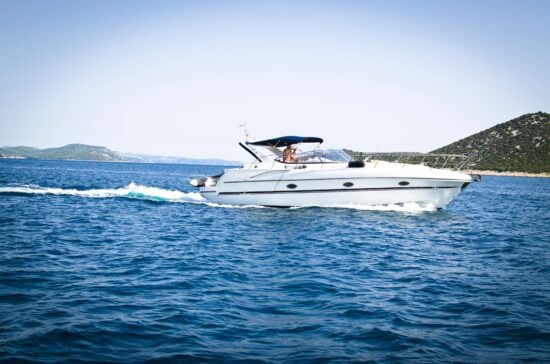Thinking about buying your first boat?
Buying a boat is more complex than buying a car, but the same considerations come into play: Should I buy new or used? What features do I want on my boat? Do I have enough money to properly maintain it?
If this is your first time buying a boat, beginning the process may be the hardest step of all. Fortunately, this boat-buying guide will be in your life raft when treading unfamiliar waters. With this guide at the ready, you’ll be able to make a selection in terms of boat brand, length, options, registration, and costs.
Ready to find your perfect boat? Anchor’s up — let’s go!
What Should I Look for When Buying My First Boat?
There are three main boat categories — sailboats, motorboats, and unpowered craft. Boat size can range from a canoe to a mega yacht — and everything in between. Some common vessels include:
- Yacht: Any boat over 30 feet.
- Fishing Boat: Anglers and their boats line up in the freshwater and saltwater camps.
- Waterskiing Boat: Ski boats have strong engines, space for the whole family, storage, and great towing capabilities. Characterized by sleek designs and a large wakeboard tower. These boats dominate the Orlando, Florida Everglades, which are known as The “North Shore” of waterskiing.
The vessels above not only vary by size but also by total horsepower. (Note: A boat’s total engine power is measured in horsepower).
Because your boating experience will, largely, be shaped by the vessel you choose, you’ll want to take this decision seriously.
What Are the Types of Boats?
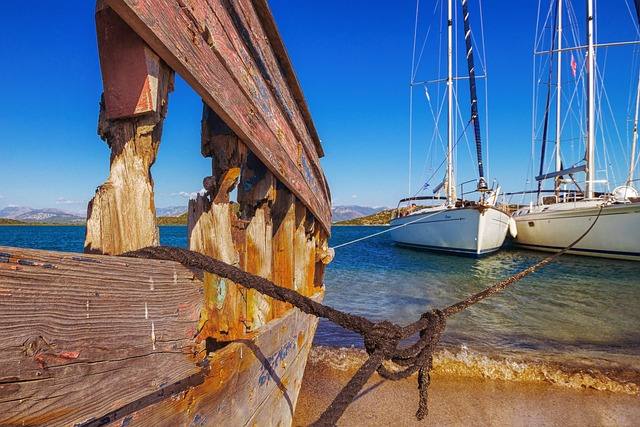
Neighbor‘s got you covered with lots of useful articles about boat types:
When Should You Buy a Boat? And Where?
- Boat Shows
- Online Listings
- Boat Dealers
- Boattraders
Once you’ve decided what the right boat is for you, it’s time to go searching. There are many different ways to go about the boat-buying process, but here are a few tried and tested methods:
You’ll also want to take the boat for a sea trial (test drive) before purchase. If you’re going to take a test drive, you’ll need to buy a boat during the warmer seasons — not when the lake is frozen!)
Check out this video: How to Drive a Boat for Beginners.
Buying a Used Boat? Follow This Quick Boat Inspection Checklist

If you’ve decided to purchase a used vessel, we recommend paying an expert to perform a thorough inspection. Wear and tear on boats can be invisible to those without the requisite nautical know-how.
Here are some starting points for inspection. (You can find a more comprehensive list here.)
- Run your hands down the hull, looking for abnormalities like pressure dings (a dent in the metal or fiberglass) or shoddy repairs. The hull, keel, and rudder should be barnacle-free.
- Check for leaks or corrosion (rust is like cancer to boats — you want to stop it before it starts)
- Check the fuel and oil.
- Fire up the electronics.
- Test the responsiveness of the tiller or the helm (the big “steering wheel” on larger boats).
- With sailboats, inspect each sail for tears, look for sticky Harken blocks, and ensure the keel isn’t damaged (you might need a snorkel for this one!).
Bilge pump: Be sure it’s working, or your boat can become a floating bathtub.
- Though not an inspection item, you should inquire about the boat’s warranty.
While quick DIY inspection can help you scope out early signs of trouble, you’ll still want to hire a marine surveyor to evaluate the condition of any pre-owned boat. It’s 100% worth the investment of money now to save you from big problems later.
But why exactly is it worth it to hire professionals to inspect a used boat? In the case of a boat’s engine, a visual inspection may not reveal the true lifespan of the engine
(Note: Engine life is defined by hours of use, not the age of the boat).
An inboard engine is also more difficult to inspect than an outboard engine. If you want to feel confident that you are getting an honest assessment of engine life, you should work with a reputable broker. They can provide a fair assessment of the boat’s value.
Do You Need a License for a Boat, and How Do You Obtain One?
Boating License requirements for all states can be found on DMV.com’s Boating License page.
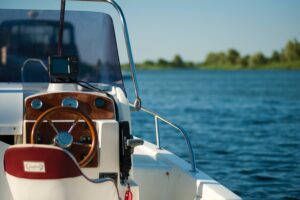
Do I Have to Register My Boat?
Much like automobiles, most watercraft require registration. If your boat type is included in the list below (and therefore requires registering, you can begin the registration process at your local DMV office.
Boats That Require Registration:
- Any powerboat.
- Any sailboat.
- Motorized vessels like jet skis.
Boats that Do No Require Registration:
- Any boat that is propelled only by oars or paddles.
- Surfboards or sailboards.

Is Insurance Required to Buy a Boat?
Insurance requirements vary by state. Refer to your state’s boating laws for more information.
All major insurance companies have plans for boat owners, so you shouldn’t have a problem finding coverage for your vessel.
How Much Does It Cost to Buy a Boat?
The first question is: Do you want to buy a new or used boat? And what kind of boat is right for you?
The following table gives a general idea of how much a boat will cost, accounting for factors like the length of the boat (which is a good rule of thumb to go by when boat buying). In other words, the length of the boat will usually correlate with the price point: the longer the boat, the higher the price point.
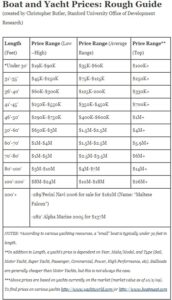
Once you’ve honed in a target boat length, you can start spinning the dials on different boat options with a price calculator.
If you’re looking at a specific used boat, you should perform a search by Hull Identification Number (HIN), which is like a VIN on a car.
When buying used, you can usually negotiate the boat’s purchase price down from the asking price. The best way to prepare for a used boat sale is to educate yourself as much as possible about the market value of the boat and its bells and whistles. You’ll also want to brush up on common boating terms, so you don’t find yourself drowning in jargon (and exorbitant costs).
Keep in mind that prices can vary considerably by location.
Once you’ve settled the used vs. new debate, you’ll need to decide whether you plan to pay upfront or take out a loan. Check out the Forbes list of Best Boat Loans 2023.
How Much Does It Cost to Maintain a Boat?
Being a boat owner involves many ongoing costs that all potential boat buyers should be aware of. Boats do have a reputation as a money pit, and while this is exaggerated, good boat maintenance is certainly an investment, both time and money-wise.
Because maintenance requirements vary by boat type, boat age, and how many hours of use the vessel has logged, it’s difficult to estimate how much you will spend on maintenance.
If you are buying used to buy a cheaper boat, don’t forget that maintenance demands only increase when upkeeping a used boat (compared to a new boat).
- Fuel
- Insurance
- Maintenance
- Docking/Marina fees
- Storage: Convenient and fairly-priced storage spaces near you.
Yes, the maintenance costs are significant. But as a new boat owner, you’ll want to savor the joys of the boating lifestyle: namely, the freedom to leave your troubles on shore and go wherever you please. You’ll also have the opportunity to bond with a whole new community when you start boating.
For most boat owners, this sense of comradery in the boating community makes the price of admission more than worth it.
Top 10 Reasons You Should Buy a Boat
As we mentioned, the boating lifestyle can make all of the costs worth it. Here are 10 reasons why you’ll love being a boat owner:
Captaincy
Once you’ve bought your boat and put it on water, you can now refer to yourself as “captain”, “skipper”, or “boat pilot.” How cool is that?
Time with Friends and Family
Whether it’s your spouse and children, two dogs, or grandma, the boat will bring you closer together.
As a community, boaters are thick as thieves. Most marinas have a bar where salty characters spin endless yarns. This is a great place to meet experienced captains who can share invaluable knowledge with you about local boating conditions. You can also pick up extra crew around the marina.
Gets You Outside
Instead of watching Parks and Recreation for the fifth time, you can immerse yourself in wind, waves, and sun.
It’s More Affordable Than You Think
We hope this article doesn’t intimidate would-be boat buyers. Whether you have no budget or a tight budget, there’s a boat for you.
If all you have is $1000, check out inflatable kayaks – a new category of boat that allows you to store your boat in a backpack!
Stress Relief
Being on the water brings out some elemental side of us. Noaters find renewal and serenity by leaving their troubles on shore. (Cue “Sailing” by Christopher Cross.)
Instills Self-Reliance
When you’re out on your boat, you are responsible for the safety of every passenger on board. The rigor of boating — from rigging up a sailboat to knowing how to troubleshoot a stalled outboard engine — builds character.
Before hitting the water, you’ll need to learn a few things with your new boat. Some of these things will have to do with the boat itself, but some may have to do with fishing, water sports, or navigation. Remember, knowledge is power.
If boating is uncharted territory, there are plenty of resources to help you get out on the water, ranging from in-person to online courses and classes.
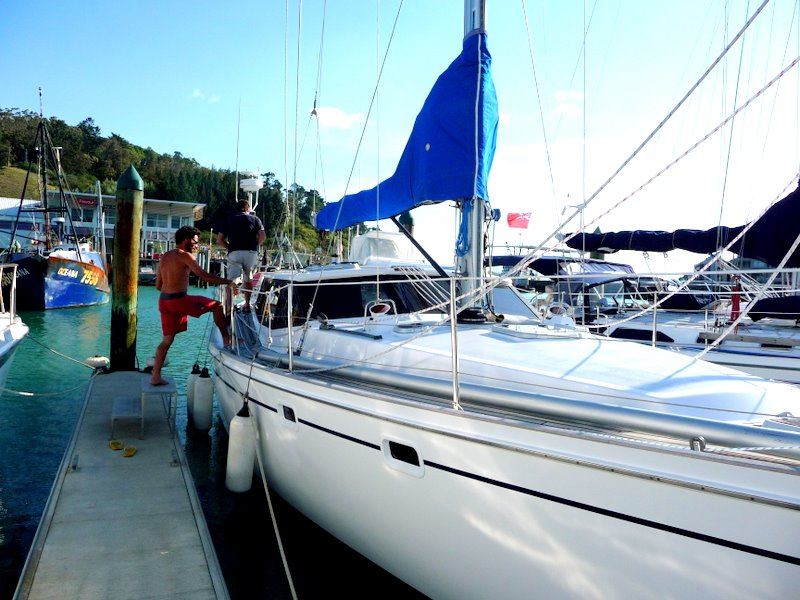
What Are the Best Well-Known Boat Brands?
According to Ranker.com, here are 10 of the best boat manufacturers. Picking an established manufacturer can make it easier to decide. Any of these could be the right boat for you.
- Sea Ray. Ranging from their smaller boat SPX series to their huge Sports and L-Class Yachts, these boats are meant for boaters with a need for speed.
- Chaparral. Water sports fans rejoice because you’ll find exactly what you need with a Chaparral.
- Boston Whaler. A household name for over 60 years, you’ll find some Skiffs and plenty of Cuddy Cabins and Center Consoles in this fleet.
- Grady-White. From the 18′ Fisherman 180 to the 30′ Marlin 300, your fishing needs are covered with a Grady-White.
- Pursuit. Boasting a wide range of Center and Dual Console models, Pursuit Boats also offers some great Sports variety, pleasing both fishermen and families.
- MasterCraft. Masters of ski and wakeboard boats, their models are bright, stylish, and well-known.
- Formula. With a name like that you expect some speed, and that’s exactly what you can find here. Formula boats are sleekly designed and meant to cut and speed through the water.
- Yamaha. Known for many things, including their marine machines. The majority of their selections are meant for water sports and cruising over the water, but their center console options will keep the fishermen happy.
- Bertram. They build yachts. They’re big and luxurious.
- Wellcraft. You wouldn’t feel out of place teaching your kids how to fish on a Wellcraft. A great family boat.
What Type of Boat Trailer Should I Buy?
When embarking on a boating excursion, you’ll need to haul your boat to and from your go-to boating destination—which means getting a trailer is a necessity.
There are two main types of trailers:
Bunk Trailers
Bunk Trailers are generally simpler and more affordable than roller trailers. They typically consist of two long boards covered in a felt-like material that run along the metal frame of the trailer.
Roller Trailers
Roller Trailers consist of a metal frame with a series of rollers attached. These rollers guide your boat onto the trailer and into a safe transport-friendly position.
There are more parts on a roller trailer compared to a bunk trailer. Though safer for your boat, this type of trailer is more expensive to buy and maintain).
How Much Does It Cost to Store a Boat?
You found the perfect boat. Now, how to store it?
Winter storage is an important consideration, as many boat owners winterize their boat and store it for six months or longer in the cold season. A boat cover is essential.
The cheapest option for storing your vessel is your garage. If this isn’t an option, marinas are the most expensive option, followed by commercial storage facilities. Thankfully, you can find some great deals close to home using peer-to-peer storage marketplaces like Neighbor.
